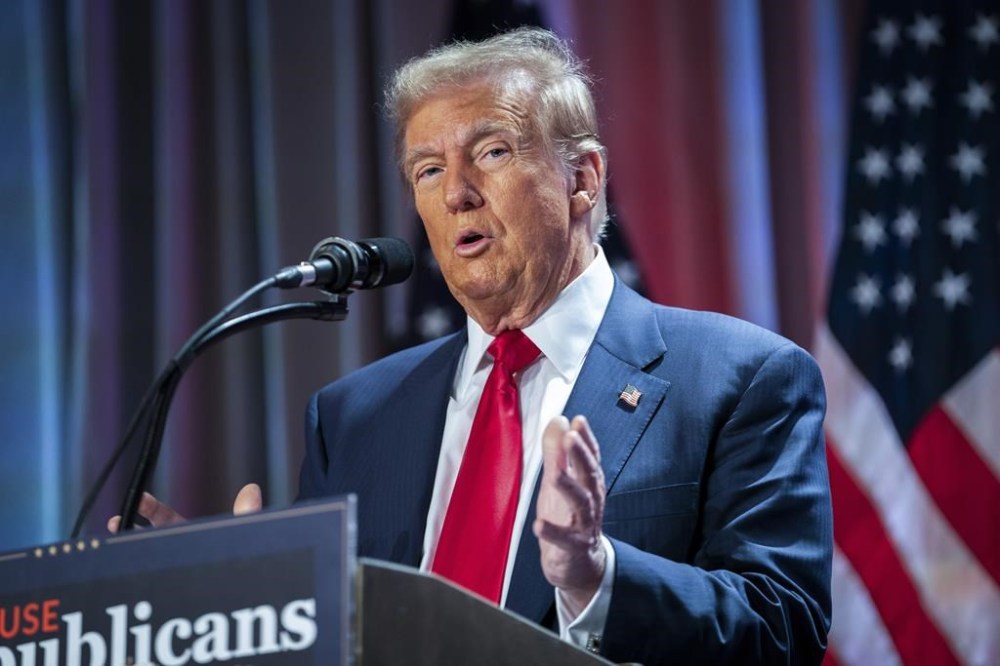Trump threatens 100% tariff on the BRIC bloc of nations if they act to undermine US dollar
Advertisement
Read this article for free:
or
Already have an account? Log in here »
To continue reading, please subscribe:
Monthly Digital Subscription
$0 for the first 4 weeks*
- Enjoy unlimited reading on winnipegfreepress.com
- Read the E-Edition, our digital replica newspaper
- Access News Break, our award-winning app
- Play interactive puzzles
*No charge for 4 weeks then price increases to the regular rate of $19.00 plus GST every four weeks. Offer available to new and qualified returning subscribers only. Cancel any time.
Monthly Digital Subscription
$4.75/week*
- Enjoy unlimited reading on winnipegfreepress.com
- Read the E-Edition, our digital replica newspaper
- Access News Break, our award-winning app
- Play interactive puzzles
*Billed as $19 plus GST every four weeks. Cancel any time.
To continue reading, please subscribe:
Add Free Press access to your Brandon Sun subscription for only an additional
$1 for the first 4 weeks*
*Your next subscription payment will increase by $1.00 and you will be charged $16.99 plus GST for four weeks. After four weeks, your payment will increase to $23.99 plus GST every four weeks.
Read unlimited articles for free today:
or
Already have an account? Log in here »
Hey there, time traveller!
This article was published 30/11/2024 (356 days ago), so information in it may no longer be current.
WEST PALM BEACH, Fla. (AP) — President-elect Donald Trump on Saturday threatened 100% tariffs against a bloc of nine nations if they act to undermine the U.S. dollar.
His threat was directed at countries in the so-called BRIC alliance, which consists of Brazil, Russia, India, China, South Africa, Egypt, Ethiopia, Iran and the United Arab Emirates.
Turkey, Azerbaijan and Malaysia have applied to become members and several other countries have expressed interest in joining.

While the U.S. dollar is by far the most-used currency in global business and has survived past challenges to its preeminence, members of the alliance and other developing nations say they are fed up with America’s dominance of the global financial system.
The dollar represents roughly 58% of the world’s foreign exchange reserves, according to the IMF and major commodities like oil are still primarily bought and sold using dollars. The dollar’s dominance is threatened, however, with BRICS’ growing share of GDP and the alliance’s intent to trade in non-dollar currencies — a process known as de-dollarization.
Trump, in a Truth Social post, said: “We require a commitment from these Countries that they will neither create a new BRICS Currency, nor back any other Currency to replace the mighty U.S. Dollar or, they will face 100% Tariffs, and should expect to say goodbye to selling into the wonderful U.S. Economy.”
At a summit of BRIC nations in October, Russian President Vladimir Putin accused the U.S. of “weaponizing” the dollar and described it as a “big mistake.”
“It’s not us who refuse to use the dollar,” Putin said at the time. “But if they don’t let us work, what can we do? We are forced to search for alternatives.”
Russia has specifically pushed for the creation of a new payment system that would offer an alternative to the global bank messaging network, SWIFT, and allow Moscow to dodge Western sanctions and trade with partners.
Trump said there is “no chance” BRIC will replace the U.S. dollar in global trade and any country that tries to make that happen “should wave goodbye to America.”
Research shows that the U.S. dollar’s role as the primary global reserve currency is not threatened in the near future.
An Atlantic Council model that assesses the dollar’s place as the primary global reserve currency states the dollar is “secure in the near and medium term” and continues to dominate other currencies.
Trump’s latest tariff threat comes after he threatened to slap 25% tariffs on everything imported from Mexico and Canada, and an additional 10% tax on goods from China, as a way to force the countries to do more to halt the flow of illegal immigration and drugs into the U.S.
He has since held a call with Mexican President Claudia Sheinbaum, who said Thursday she is confident that a tariff war with the United States can be averted. Canadian Prime Minister Justin Trudeau returned home Saturday after meeting Trump, without assurances the president-elect will back away from threatened tariffs on Canada.


